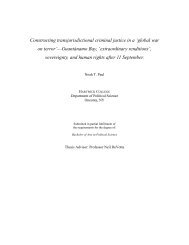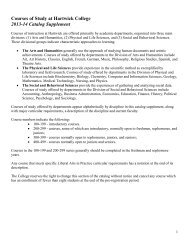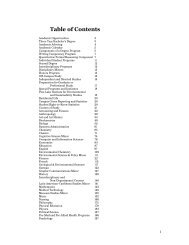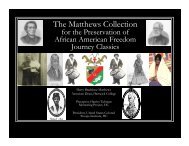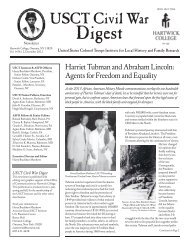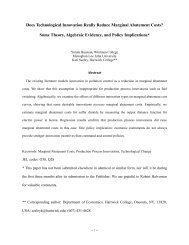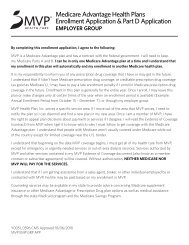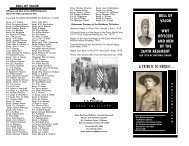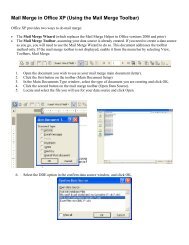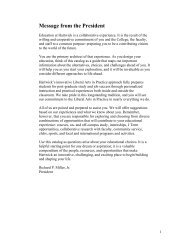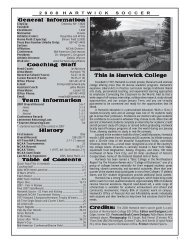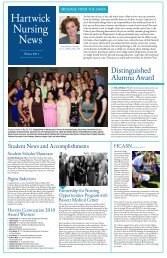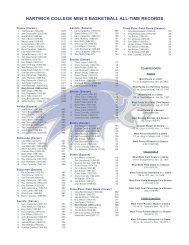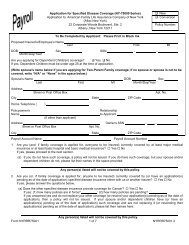Table of Contents - Hartwick College
Table of Contents - Hartwick College
Table of Contents - Hartwick College
Create successful ePaper yourself
Turn your PDF publications into a flip-book with our unique Google optimized e-Paper software.
B. International Politics<br />
105 International Relations (3 credits) An introduction to politics<br />
among and across nation-state, non-state and transnational actors.<br />
Competing theories on concepts such as power, security, nationalism,<br />
nation building, and the emerging international system are examined.<br />
Other issues examined include: the uneven global economy, globalization,<br />
patterns <strong>of</strong> cooperation and conflict, conflict resolution, international<br />
organization and law, human rights, and political transitions. Some<br />
country case studies are used to provide comparative analyses <strong>of</strong> issues<br />
across political settings. (SBA)<br />
205 U.S. Foreign Policy (3 credits) A study <strong>of</strong> U.S. foreign policy, the<br />
politics <strong>of</strong> how that policy is formulated and implemented, and the<br />
consequences <strong>of</strong> that policy for other states. Themes and trajectories in<br />
U.S. policy history such as isolationism, international activism,<br />
intervention, hegemonic presumption, strategic alliances, arms control,<br />
and unilateralism, among others, are reviewed with focus upon the<br />
sources, goals, and assumptions <strong>of</strong> U.S. policy. Approaches to U.S.<br />
national security (broadly defined) are examined as students assess the<br />
values underpinning the projection, use, and preservation <strong>of</strong> U.S. power<br />
in the post-Cold War world. Prerequisite: Posc 101 or 111, or 105, or<br />
permission <strong>of</strong> instructor. (SBA)<br />
215 International Organizations (3 credits) This course is designed<br />
to provide students with a deeper understanding <strong>of</strong> leading organizations<br />
and processes that enable order, stability, and cooperation in the<br />
international system. It examines critical approaches to the study <strong>of</strong><br />
international organizations and the impact these organizations exert on<br />
various issues and areas <strong>of</strong> the contemporary world. It also evaluates the<br />
United Nations and the European Union and analyzes the unique<br />
functions both perform and the novel challenges both are confronted<br />
within an increasingly more complex and interdependent world.<br />
Typically, students also will study the work <strong>of</strong> a nongovernmental<br />
organization, so as to understand how such NGOs develop and the<br />
philosophical and political challenges they face. Offered alternate years.<br />
Prerequisite: Posc 105. (SBA)<br />
235 The Political Economy <strong>of</strong> Poor Countries (3 credits) An<br />
examination <strong>of</strong> the political and economic dimensions <strong>of</strong> “development”<br />
processes in agrarian and newly industrializing countries <strong>of</strong> the global<br />
South. Competing theories <strong>of</strong> development are considered within the<br />
contexts <strong>of</strong> the states’ diverse experiences, relative powerlessness and the<br />
complex global economic order. Issues <strong>of</strong> debt, dependency, aid, global<br />
trade, nation building, and political change are examined. Case studies<br />
are drawn from Asia, Africa, the Middle East and Latin America. Posc 105<br />
is recommended. Offered alternate years. (SBA) or (NTW)<br />
245 The Model UN (1 credit) This course prepared first-time<br />
participants for the Harvard Model UN role place, which takes place in<br />
February (in Boston) every year. The course meets during the second half<br />
<strong>of</strong> Fall Term, with the final grade being issued after the student’s<br />
participation in the three-day February role play. The course is tied to<br />
participation in the model UN. Students are taken through the process <strong>of</strong><br />
resolution writing, inter-state negotiation, committee work, and are<br />
207



